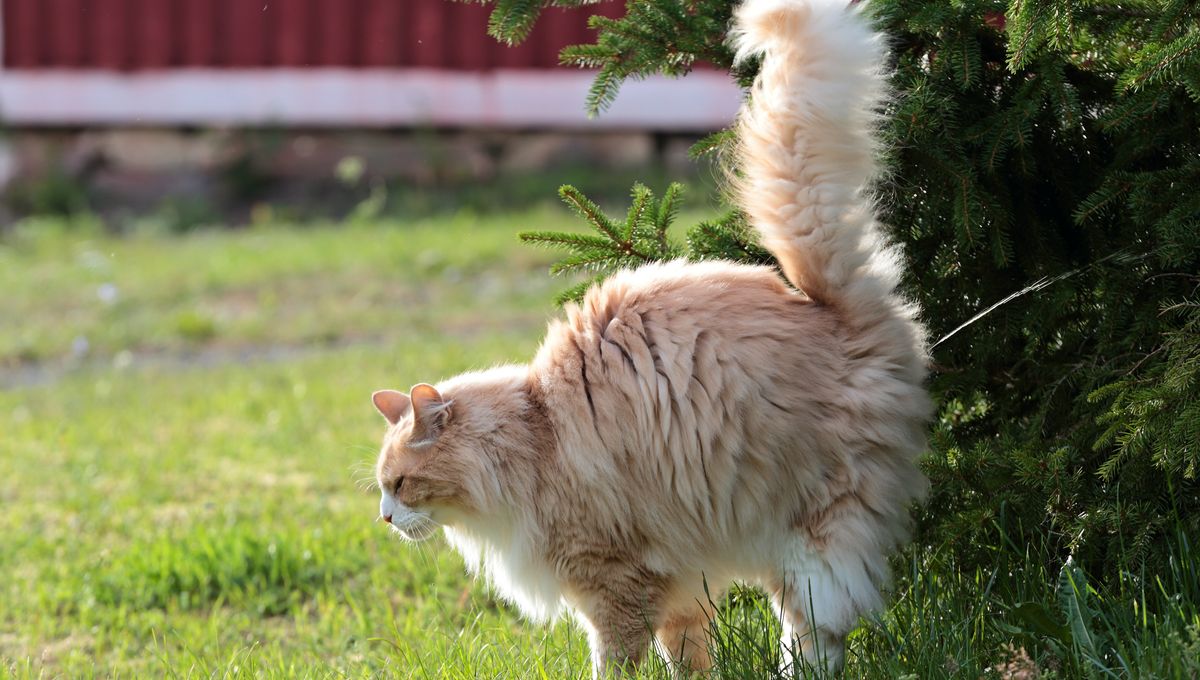
Making biscuits, purring, the little headbutts, that chirping noise they sometimes make – these are just some of the many perks of having a cat in your life. Spraying their pungent-smelling pee? Not so much. But why does it smell so much worse than normal litterbox pee? You ask the questions – a new study from scientists in Japan has the answers.
The origin of the powerful aroma of cat spray has occupied researchers for some time. Twenty years ago, project leader Professor Masao Miyazaki discovered that cat urine contains a large quantity of a protein called cauxin (a name that comes from the Japanese word for “curiosity”), which contributes to its distinctive smell.
But ask just about any cat owner, and they’ll tell you that smell is very different depending on whether the urine is contained within the litterbox or sprayed against a wall in the garden. One suggestion that’s been put forward is that sprayed urine may contain extra chemicals, possibly secreted from the anal sac.
Miyazaki and colleagues investigated this by collecting different urine samples, but found no evidence to support the hypothesis. Samples of spray and normal urine from the same cat had a high degree of similarity, suggesting they both originated solely from the bladder.
That still doesn’t explain why the human nose perceives these two types of pee as distinct from each other. However, an observation made while they were analyzing the samples pushed the team’s investigation in a new direction. They noticed that the cat urine was “sticking” to the inside of the plastic syringes they were using, a property chemists refer to as “wettability”.
“Generally, the wettability of a liquid on solid surface increases as the surface tension decreases,” explained first author Reiko Uenoyama in a statement. “Based on this knowledge, we hypothesized that the high protein concentration in cat urine might reduce the surface tension of cat urine, enhancing the emission of urinary volatile compounds from the large vertical surface area that [the urine was spread over].”
The key appears to be the protein Miyazaki identified all those years ago: cauxin. Experiments showed that a solution of cauxin had higher wettability than a similar solution containing the mammalian blood protein albumin. Cat urine with high cauxin levels had significantly lower surface tension than urine with the proteins removed, and more readily adhered to a vertical glass surface.
The team then set up two artificial gardens. In one, a brick was sprayed with tomcat pee. In the other, the same pee was poured onto the soil and covered up. That oh-so-familiar kitty smell was only detectable from the sprayed sample.
“The difference in environmental odors between the two gardens, despite using the same urine sample, can be explained by most of the urinary volatile chemicals being trapped in the porous structure of the sandy soil. This phenomenon did not occur in the urine adhering to the surface of the block,” Miyazaki explained.
“Additionally, liquid droplets of sprayed urine can easily dry on the surface of the block, resulting in greater emissions of volatile chemicals from the scent mark rapidly as compared to from normal urine.”
So, there you have it. Spray is just the same pee that cats usually bury under soil or litter. It’s the act of spraying itself, facilitated by the high levels of cauxin, that gives unsuspecting humans such a malodorous experience.
They’re weird – and sometimes stinky – little guys… but we still can’t get enough of ‘em.
The study is published in the Journal of Chemical Ecology.
Source Link: Why Sprayed Cat Pee Smells So Bad, According To Science